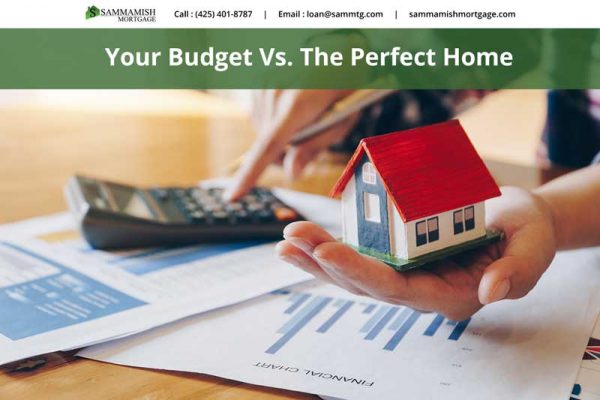No Obligation and transparency 24/7. Instantly compare live rates and costs from our network of lenders across the country. Real-time accurate rates and closing costs for a variety of loan programs custom to your specific situation.

Recent surveys have found that many potential buyers are considering stretching their budgets in order to buy the home of their dreams. In this article, we’ll go over why that is and whether or not paying a little more for the perfect house makes sense financially.
When planning a home purchase, typically, people want to leave a little wiggle room in their budgets. That said, when it comes to that perfect home, more than a third of homebuyers are willing to spend more than their budget may allow.
At the same time, others are even spending thousands of dollars more than they originally expected in order to lock down the house of their dreams. Thus, this begs the question, how important is setting a budget, and if a home has it all and then some, should you just assume that you are going to go over budget?
More often than not, when someone is looking for a home, the first step is to know the budget—how much mortgage you can get approved for, how much mortgage you can afford, and preparing for unexpected expenses. Clearly, all of these things still matter. But when faced with your dream home, surveys suggest you may be open to spending more if it means owning the perfect home.
Moreover, with historically low rates and less than 6-months’ worth of inventory in some of the country’s hottest markets, you might end up spending a little more regardless. But why? Well, usually, there are a few other reasons besides a home being perfect. For instance, in a seller’s market, bidding wars are more likely to occur, and thus making an offer over the asking price could make all the difference.
In addition to potential competition during the homebuying process, house hunting, for many, is not a walk in the park. Thus, when you fall in love at first sight with a home, especially after looking at countless others, spending more to get the ball rolling often makes sense. But be that as it may, having a budget with a certain amount of flexibility that you plan on sticking to, for the most part, is still a good idea.
Consequently, as a rule of thumb, if at all possible, you should aim to spend less than 28 to 40 percent of your monthly income on housing expenses. Of course, this is monthly income before taxes and should also factor in any other debts you may have to determine how much you can truly afford. Note, a trained mortgage professional can also help you figure out how much house you can afford given your specific financial situation.
Overall, most buyers are willing to go a couple thousand dollars over their initial budget when home shopping. In fact, according to a recent LendingTree survey, nearly two-thirds of buyers surveyed said they would go over budget for the perfect house—approximately $25,000 over for the home that they felt was their ideal match. Currently, the average price of a new home in 2022 is $331,533, and with lower than average mortgage rates this year, the good news is that many buyers can actually afford a little wiggle room.
Though it is important to keep in mind that the hotter the market, the more flexible your budget needs to be. What’s more, buyers—both first-time and seasoned—have been able to buy more expensive homes, all while keeping well within their housing budget thanks to nearly unprecedented rates.
Once you have figured out your initial budget and where you stand on wiggle room, it is time to come up with a list of must-haves and features that would be nice to have. Obviously, determining what features you want to include in the budget will allow you to get a better sense of how much you will be spending.
There are some things that homeowners need to have or rather must have, such as a certain number of bedrooms. Then, there are features that people would like to have but are not necessary. So, what happens if you find a home with everything? Should you go over budget?
Well, if you find that your price range is not matching up with the homes you want, you do not necessarily have to make compromises on your requirements or lose out in a competitive market. Instead, the solution just might be to add more wiggle room to your budget to get into a home that fits your needs.
In the end, a home is more than just a number on a piece of paper. Because a home is also about intangible values and benefits, it is okay for homeowners to go over their budget slightly for the perfect home because there is a great chance that they are going to be there for years to come.
Ultimately, if you do go over budget, you still need to be very cautious, as most people underestimate the maintenance costs associated with owning a home. And remember, a mortgage is not the only recurring expense: homeownership comes with a lot of other ongoing costs, which as a buyer, you will need to anticipate. Thus, in addition to maintenance costs, you will need to factor in homeowners’ insurance, utilities, repairs, and even property taxes. That said, only you know how far over budget you are willing to go for your dream home.
Are you curious about mortgages, or are you ready to apply for one to buy a home? If so, Sammamish Mortgage can help. We are a local mortgage company from Bellevue, Washington, serving the entire state, as well as Oregon, Idaho, and Colorado. We offer many mortgage programs to buyers all over the Pacific Northwest and have been doing so since 1992. Contact us today with any questions you have about mortgages.


Whether you’re buying a home or ready to refinance, our professionals can help.
{hours_open} - {hours_closed} Pacific
No Obligation and transparency 24/7. Instantly compare live rates and costs from our network of lenders across the country. Real-time accurate rates and closing costs for a variety of loan programs custom to your specific situation.